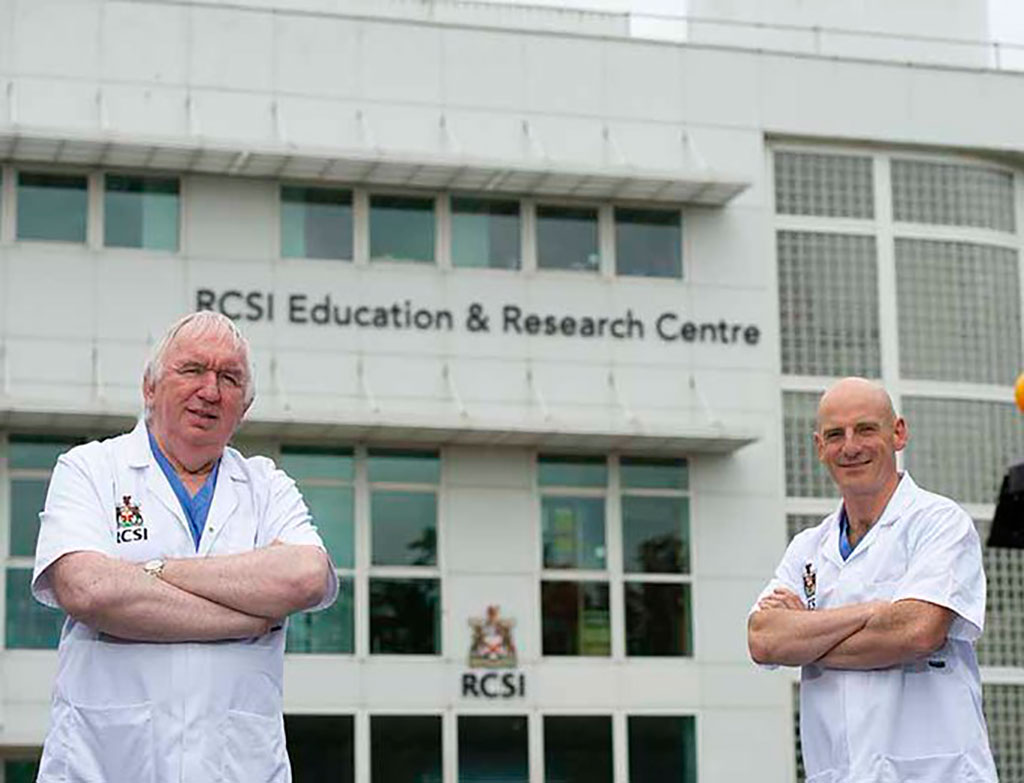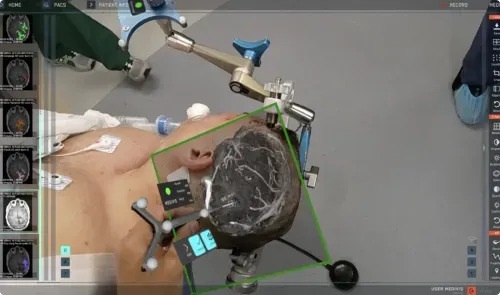New Blood Test Accurately Predicts COVID-19 Patients at Risk of Severe Infection
|
By HospiMedica International staff writers Posted on 19 Oct 2020 |

Image: Professor Gerry McElvaney (left), the study’s senior author and a consultant in Beaumont Hospital, and Professor Ger Curley (right). (Photo courtesy of RCSI Education and Research Centre in Beaumont Hospital)
Scientists have developed, for the first time, a score that can accurately predict which patients will develop a severe form of COVID-19.
Researchers at RCSI University of Medicine and Health Sciences (Dublin, Ireland) have developed a measurement called the Dublin-Boston score that is designed to enable clinicians to make more informed decisions when identifying COVID-19 patients who may benefit from therapies, such as steroids, and admission to intensive care units. Until this study, no COVID-19-specific prognostic scores were available to guide clinical decision-making. The Dublin-Boston score can now accurately predict how severe the infection will be on day seven after measuring the patient’s blood for the first four days.
The blood test works by measuring the levels of two molecules that send messages to the body’s immune system and control inflammation. One of these molecules, interleukin (IL)-6, is pro-inflammatory, and a different one, called IL-10, is anti-inflammatory. The levels of both are altered in severe COVID-19 patients. Based on the changes in the ratio of these two molecules over time, the researchers developed a point system where each 1-point increase was associated with a 5.6 times increased odds for a more severe outcome. The Dublin-Boston score uses the ratio of IL-6 to IL-10 because it significantly outperformed measuring the change in IL-6 alone.
“The Dublin-Boston score is easily calculated and can be applied to all hospitalised COVID-19 patients,” said RCSI Professor of Medicine Gerry McElvaney, the study’s senior author. “More informed prognosis could help determine when to escalate or de-escalate care, a key component of the efficient allocation of resources during the current pandemic. The score may also have a role in evaluating whether new therapies designed to decrease inflammation in COVID-19 actually provide benefit.”
Related Links:
RCSI University of Medicine and Health Sciences
Researchers at RCSI University of Medicine and Health Sciences (Dublin, Ireland) have developed a measurement called the Dublin-Boston score that is designed to enable clinicians to make more informed decisions when identifying COVID-19 patients who may benefit from therapies, such as steroids, and admission to intensive care units. Until this study, no COVID-19-specific prognostic scores were available to guide clinical decision-making. The Dublin-Boston score can now accurately predict how severe the infection will be on day seven after measuring the patient’s blood for the first four days.
The blood test works by measuring the levels of two molecules that send messages to the body’s immune system and control inflammation. One of these molecules, interleukin (IL)-6, is pro-inflammatory, and a different one, called IL-10, is anti-inflammatory. The levels of both are altered in severe COVID-19 patients. Based on the changes in the ratio of these two molecules over time, the researchers developed a point system where each 1-point increase was associated with a 5.6 times increased odds for a more severe outcome. The Dublin-Boston score uses the ratio of IL-6 to IL-10 because it significantly outperformed measuring the change in IL-6 alone.
“The Dublin-Boston score is easily calculated and can be applied to all hospitalised COVID-19 patients,” said RCSI Professor of Medicine Gerry McElvaney, the study’s senior author. “More informed prognosis could help determine when to escalate or de-escalate care, a key component of the efficient allocation of resources during the current pandemic. The score may also have a role in evaluating whether new therapies designed to decrease inflammation in COVID-19 actually provide benefit.”
Related Links:
RCSI University of Medicine and Health Sciences
Latest COVID-19 News
- Low-Cost System Detects SARS-CoV-2 Virus in Hospital Air Using High-Tech Bubbles
- World's First Inhalable COVID-19 Vaccine Approved in China
- COVID-19 Vaccine Patch Fights SARS-CoV-2 Variants Better than Needles
- Blood Viscosity Testing Can Predict Risk of Death in Hospitalized COVID-19 Patients
- ‘Covid Computer’ Uses AI to Detect COVID-19 from Chest CT Scans
- MRI Lung-Imaging Technique Shows Cause of Long-COVID Symptoms
- Chest CT Scans of COVID-19 Patients Could Help Distinguish Between SARS-CoV-2 Variants
- Specialized MRI Detects Lung Abnormalities in Non-Hospitalized Long COVID Patients
- AI Algorithm Identifies Hospitalized Patients at Highest Risk of Dying From COVID-19
- Sweat Sensor Detects Key Biomarkers That Provide Early Warning of COVID-19 and Flu
- Study Assesses Impact of COVID-19 on Ventilation/Perfusion Scintigraphy
- CT Imaging Study Finds Vaccination Reduces Risk of COVID-19 Associated Pulmonary Embolism
- Third Day in Hospital a ‘Tipping Point’ in Severity of COVID-19 Pneumonia
- Longer Interval Between COVID-19 Vaccines Generates Up to Nine Times as Many Antibodies
- AI Model for Monitoring COVID-19 Predicts Mortality Within First 30 Days of Admission
- AI Predicts COVID Prognosis at Near-Expert Level Based Off CT Scans
Channels
Artificial Intelligence
view channel
AI-Powered Algorithm to Revolutionize Detection of Atrial Fibrillation
Atrial fibrillation (AFib), a condition characterized by an irregular and often rapid heart rate, is linked to increased risks of stroke and heart failure. This is because the irregular heartbeat in AFib... Read more
AI Diagnostic Tool Accurately Detects Valvular Disorders Often Missed by Doctors
Doctors generally use stethoscopes to listen for the characteristic lub-dub sounds made by heart valves opening and closing. They also listen for less prominent sounds that indicate problems with these valves.... Read moreCritical Care
view channel.jpeg)
Transcatheter Valve Replacement Outcomes Similar To Surgery, Finds Study
A new study has shown that a minimally invasive procedure for replacing the aortic valve in the heart—known as transcatheter aortic valve replacement (TAVR)—is on par with the more traditional surgical... Read more
Revascularization Improves Life Quality in Chronic Limb-Threatening Ischemia, Finds Study
Researchers have undertaken a detailed study to evaluate the effects of revascularization strategies on the health-related quality of life (HRQoL) of patients with chronic limb-threatening ischemia.... Read moreSurgical Techniques
view channel
AR Surgical Technology Translates Complex 2D Medical Imaging to Enhance Accuracy
Surgeons often have to switch their focus between a patient’s data displayed on a screen or clipboard and the patient themselves during procedures. But that is about to change. Surgeons can now utilize... Read more
Miniaturized Snake-Like Probe Images Cerebral Arteries From Within
Endovascular interventions are being increasingly favored for treating strokes and cerebral artery diseases, but rely heavily on angiographical imaging that often struggles with limited contrast and spatial... Read morePatient Care
view channelFirst-Of-Its-Kind Portable Germicidal Light Technology Disinfects High-Touch Clinical Surfaces in Seconds
Reducing healthcare-acquired infections (HAIs) remains a pressing issue within global healthcare systems. In the United States alone, 1.7 million patients contract HAIs annually, leading to approximately... Read more
Surgical Capacity Optimization Solution Helps Hospitals Boost OR Utilization
An innovative solution has the capability to transform surgical capacity utilization by targeting the root cause of surgical block time inefficiencies. Fujitsu Limited’s (Tokyo, Japan) Surgical Capacity... Read more
Game-Changing Innovation in Surgical Instrument Sterilization Significantly Improves OR Throughput
A groundbreaking innovation enables hospitals to significantly improve instrument processing time and throughput in operating rooms (ORs) and sterile processing departments. Turbett Surgical, Inc.... Read moreHealth IT
view channel
Machine Learning Model Improves Mortality Risk Prediction for Cardiac Surgery Patients
Machine learning algorithms have been deployed to create predictive models in various medical fields, with some demonstrating improved outcomes compared to their standard-of-care counterparts.... Read more
Strategic Collaboration to Develop and Integrate Generative AI into Healthcare
Top industry experts have underscored the immediate requirement for healthcare systems and hospitals to respond to severe cost and margin pressures. Close to half of U.S. hospitals ended 2022 in the red... Read more
AI-Enabled Operating Rooms Solution Helps Hospitals Maximize Utilization and Unlock Capacity
For healthcare organizations, optimizing operating room (OR) utilization during prime time hours is a complex challenge. Surgeons and clinics face difficulties in finding available slots for booking cases,... Read more
AI Predicts Pancreatic Cancer Three Years before Diagnosis from Patients’ Medical Records
Screening for common cancers like breast, cervix, and prostate cancer relies on relatively simple and highly effective techniques, such as mammograms, Pap smears, and blood tests. These methods have revolutionized... Read morePoint of Care
view channel
Critical Bleeding Management System to Help Hospitals Further Standardize Viscoelastic Testing
Surgical procedures are often accompanied by significant blood loss and the subsequent high likelihood of the need for allogeneic blood transfusions. These transfusions, while critical, are linked to various... Read more
Point of Care HIV Test Enables Early Infection Diagnosis for Infants
Early diagnosis and initiation of treatment are crucial for the survival of infants infected with HIV (human immunodeficiency virus). Without treatment, approximately 50% of infants who acquire HIV during... Read more
Whole Blood Rapid Test Aids Assessment of Concussion at Patient's Bedside
In the United States annually, approximately five million individuals seek emergency department care for traumatic brain injuries (TBIs), yet over half of those suspecting a concussion may never get it checked.... Read more
New Generation Glucose Hospital Meter System Ensures Accurate, Interference-Free and Safe Use
A new generation glucose hospital meter system now comes with several features that make hospital glucose testing easier and more secure while continuing to offer accuracy, freedom from interference, and... Read moreBusiness
view channel
Johnson & Johnson Acquires Cardiovascular Medical Device Company Shockwave Medical
Johnson & Johnson (New Brunswick, N.J., USA) and Shockwave Medical (Santa Clara, CA, USA) have entered into a definitive agreement under which Johnson & Johnson will acquire all of Shockwave’s... Read more



















